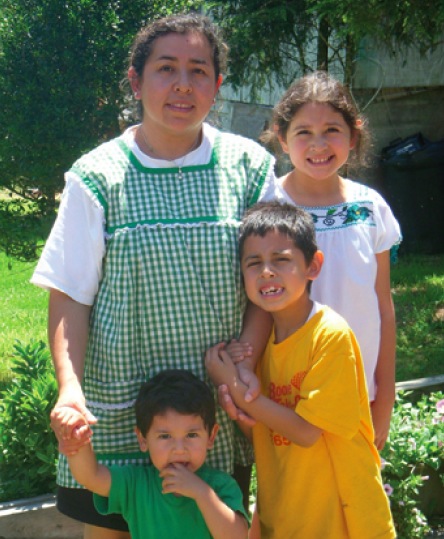FOR IMMEDIATE RELEASE
October 12, 2011
Contacts:
Mary Lee Hall, Managing Attorney, Farmworker Unit, Legal Aid of NC
919-856-2180 | maryleeh@legalaidnc.org
Bart Evans, Coordinator, Farmworker Advocacy Network
919-660-0704 | bdevans@duke.edu
Raleigh, NC – Legal Aid of North Carolina's Farmworker Unit has filed a CASPA (Complaint Against State Program Administration) with the US Department of Labor (USDOL) due to the fact that the North Carolina Department of Labor (NCDOL) is failing to ensure safe working and housing conditions for farmworkers in North Carolina. The Agricultural Safety and Health Bureau of the NCDOL is responsible for inspecting farmworker housing prior to occupancy, investigating complaints when housing is substandard, and following up on any OSHA violations which include field sanitation and health and safety in agriculture. NCDOL is also responsible for inspecting poultry industry worksites.
Farmworker advocates report that NC Labor Commissioner Cherie Berry has repeatedly ignored concerns raised by them over the years about substandard migrant farmworker housing and working conditions. Many migrant housing units are overcrowded, in disrepair and have unsanitary cooking and washing facilities. Fields where farmworkers risk exposure to pesticides and extreme temperatures harvesting crops may lack bathrooms and safe water for drinking and hand washing. “Since the farmers aren’t getting any complaints,” says a 19-year old Triangle-area farmworker, “they’re going to keep on going and working like they regularly do, without any water, port-o-john, drinking water, [or even] water to wash your hands."
Despite numerous housing and field safety violations, federal and state audits, as well as independent research, have determined that NCDOL simply fails to enforce the law. For example, NCDOL is cited for being inconsistent in the way it issues penalties, classifies violations incorrectly, and routinely reduces and/or negotiates fines downwards, even in cases where NCDOL found a high probability of serious injury. NCDOL’s own internal audit determined that it does not always follow the proper procedure for classifying violations and calculating penalties. Even when employers were aware of the violation and took no action, the violations were still not classified as “willful,” which means that the employer knew the law and violated it anyway.
Rob Segovia-Welsh, former NCDOL inspector reports that, “For over four years I conducted and accompanied co-inspectors on compliance inspections for NCDOL and I can say that 99.9% of the monetary penalties attached to health/safety violations are dramatically reduced by both the mandatory set penalty calculator devised by USDOL and by outright bargaining with the employer.”
Many agricultural employers abide by the law. But in 2009, only 55 migrant camps were inspected after workers arrived, when violations are more likely to be evident, out of more than 1200 registered camps and over 4000 total migrant camps in North Carolina in any given season. NCDOL is failing farmworkers and their children as well as honest employers who work hard to provide legal, safe working conditions. Poor migrant housing and working conditions can lead to acute and long-term illnesses and are an affront to human dignity.
For more information on the CASPA complaint contact Mary Lee Hall, Managing Attorney of the Farmworker Unit of Legal Aid of NC, at 919-856-2180 or maryleeh@legalaidnc.org. For information on research surrounding farmworker living and working conditions in North Carolina, please see below or contact Bart Evans at 919-660-0704 or bdevans@duke.edu.
###
Background & Facts
Download this fact sheet.
Nearly all of North Carolina’s more than 58,000 migrant farmworkers live in housing that is provided by the grower or crewleader. The Agricultural Safety and Health Bureau of the North Carolina Department of Labor (NCDOL), which is headed by Commissioner Cherie Berry, is responsible for inspecting migrant housing prior to occupancy, and for investigating complaints when the housing is substandard. Federal and state audits, as well as independent research, reveal the following serious problems in NCDOL’s enforcement practices.
1) NCDOL is inconsistent in the way it issues penalties.
- The amount NCDOL fines someone for a migrant housing violation can vary significantly for the same violation. For example, according to NCDOL’s recent internal audit, unadjusted penalties for failing to register a migrant camp ranged from $100 to $5,000.
2) NCDOL does not classify violations correctly, resulting in incorrect penalties.
- NCDOL was criticized by the US Department of Labor in 2009 for using guidelines that are weaker than federal guidelines, resulting in lower penalties. NCDOL rarely, if ever, classifies a violation as willful, (meaning the employer knew the law and violated it anyway), doing so only once in 2009. USDOL was 62 times more likely to cite an employer for a willful violation than was NCDOL, and more than twice as likely to classify a violation as serious.
- A review of NCDOL’s migrant housing inspections between 2006 and 2009 by the Farmworker Advocacy Network reveals that some serious violations did not result in a penalty, even at the initial citation stage. Even when employers were aware of the violation and took no action, the violations were still not classified as willful.
- The NCDOL’s internal audit determined that they do not always follow the proper procedure for classifying violations and calculating penalties.
3) NCDOL routinely reduces and/or negotiates fines downwards.
- In every migrant housing inspection reviewed by FAN during a three-year period, fines were reduced, even in cases where NCDOL found a high probability of serious injury.
- NCDOL frequently reduces penalties for housing and field sanitation violations if the employer requests an informal conference, but there are no guidelines calling for a reduction at this stage.
- A recent USDOL investigation found that NCDOL’s policies for calculating and reducing penalties resulted in inappropriately low fines for serious violations—on average only $512. NCDOL refused to change its policies in response to this investigation.
4) NCDOL does not focus its inspections on the worst migrant camps.
- In 2009, only 55 migrant camps were inspected after workers arrived, out of more than 1200 registered camps and over 4000 total migrant camps in North Carolina in any given season. There are only 7 inspectors for the entire state. According to recent research conducted by Wake Forest University, camps are more likely to have violations mid to late season after workers are living in the housing, rather than before they arrive.
- NCDOL acknowledges that it "has not met its follow-up inspection goals." Only 0.8% of inspections in 2009 were follow-up inspections to check on situations where problems were found in the past. Housing problems can persist and even worsen for years because of lack of follow-up.
- H2A camps are more likely to be inspected than non-H2A, even though housing violations are more common in non-H2A camps.
Recommendations from recent reports/research:
- Set up stricter requirements for penalty reductions.
- Change the current policies on how citations are grouped and fined as a single violation, so that serious violations are appropriately identified and addressed.
- Use the correct criteria for issuing willful violations and issue appropriate penalties when such violations are found.
- Issue serious violation citations in all instances where health and safety hazards are documented in the investigation.
- Review the effectiveness of NCDOL-initiated investigations in detecting high hazard establishments.
- Target repeat violators for follow up investigations and issue higher penalties to repeat violators.
- Increase the number of housing inspectors.
- Increase the number of post-occupancy inspections conducted.
- Expand efforts to identify and inspect unregistered camps.
- Target a portion of post-occupancy inspections to camps with no H2A workers and camps with more than 10 residents.
- End the practice of reducing fines at the informal conference stage, and strictly adhere to deadlines for requesting an informal conference.
Background Information
- Housing for migrant farmworkers is often overcrowded and unsanitary. Many migrant housing units have inadequate laundry, kitchen, and bathroom facilities.
- A 2004 Study of NC Farmworker Family Housing found that 40% of the farmworkers surveyed lived in overcrowded housing and most (63-84%) did not have washing machines or dryers.
- Most farmworkers live in labor camps in isolated, rural areas that lack telephones and their own transportation, making it difficult to get assistance in the event of an emergency.
- Many farmworker housing units lack locks on doors or windows, making them susceptible to break-ins and robberies.
- Poor migrant housing conditions lead to increased rates of lead poisoning, respiratory illnesses, ear infections, parasitic infections, and prolonged pesticide exposure.
- All H-2A camps are inspected annually by the NC DOL before they are occupied, whereas less than half of other farmworker housing is inspected at all. Scarce resources of the NCDOL are currently not focused on the housing most likely to have problems
- Uninspected camps, along with those that are repeat violators, have some of the most dangerous conditions.
Sources Include: (1) Arcury, et al., Housing Conditions in Temporary Labor Camps for Migrant Farmworkers in North Carolina, Policy Brief, Center for Worker Health, Wake Forest University School of Medicine. (2) Employment Security Commission (3) Ellen Phelps, North Carolina Migrant Housing and Safety Standards: An Empirical Assessment of Compliance and Enforcement Statistics, 2006. (4) NC Department of Labor – Agricultural Safety and Health Bureau, Annual Report to the Senate and House Appropriations Subcommittee on Natural and Economic Resources, 2009. (5) NCDOL Internal Assessment Report, March 26, 2009. (6) US Department of Labor, Occupational Safety and Health Administration, Enhanced Federal Annual Monitoring Evaluation (FAME) Report of the North Carolina Occupational Safety and Health Program, October 1, 2008 – September 30, 2009. (7) September 17, 2010 Letter from Allen McNeely to US Department of Labor, Occupational Safety and Health Administration.
Additional reports and background materials from the US Department of Labor are available here: http://www.osha.gov/dcsp/osp/efame/northcarolina.html
 Tuesday, October 18, 2011 at 4:12PM |
Tuesday, October 18, 2011 at 4:12PM |  Chris Liu-Beers
Chris Liu-Beers 















